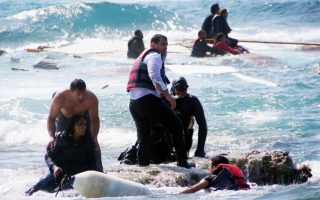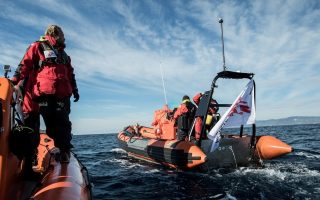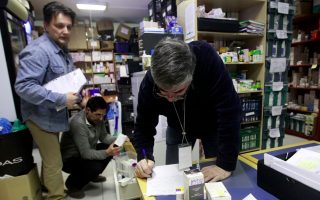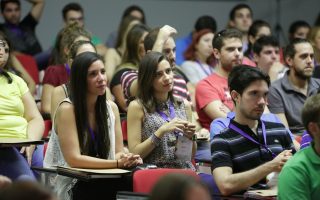Soccer brings together locals and refugees in northern Greece

The game had passion and intensity while the atmosphere was festive. It was the afternoon of Holy Wednesday at the Municipal Sports Center of Alexandreia in Imathia, northern Greece, and two strong teams were locking horns on the pitch: Megas Alexandros soccer club from Trikala, with a history of 50 years, against a team of refugee men staying at a nearby camp on the former 722 Military Base. The game ended in a 4-4 draw, though no one was really keeping score.
Nikos Lioliopoulos, a farmer from the village of Meliki, came up with the idea for the game. He has been volunteering at the refugee center, home to 500 adults and 300 children, for some time now.
“I thought it would be nice for the children to be allowed to play some soccer on the pitch nearby, to be kids for awhile,” he tells Kathimerini. Before the big game against Megas Alexandros, Lioliopoulos organized a match between the younger refugees at the camp and the children's team of PAOK Alexandreia, which consists of Roma kids from the community of Aghios Georgios.
“We had some very powerful moments, with the Syrian kids playing with tattered shoes or even no shoes at all,” says Lioliopoulos. “But it went very well; the refugee kids loved it. They begged for more games, so I had the idea to organize something bigger with the local club.”
The top scorer of the men's match was 22-year-old Hasan with three goals. It was hardly surprising. Back in Syria, he played for Al-Fotuwa, a top-flight team. He stopped when the war broke out and was forced to migrate. He passed through Turkey and into Greece in the hopes of reaching Germany.
“My dream was to play professional soccer there,” he told Lioliopoulos.
The match was also attended by dozens of international volunteers who are in Alexandreia struggling to make up for the Greek state's shortcomings in hosting the migrants and refugees.
“The game was very important for the morale of the children but also for all the refugees at the camp,” says Sarah Griffith from the UK, who works with Refugee Support Network, a nongovernmental organization that has set up a dispensary of basic commodities at the camp, among other things.
Griffith came to Greece intending to stay for five days and now she's already been here for two months. Her area of expertise is disaster relief and she has worked in Sri Lanka, the Philippines and other natural disaster zones. Nothing, however, had prepared her for the situation in Greece.
“Just today, seeing the conditions at the camp, I burst into tears,” Griffith says. “The tents are swimming in water because of the rain. The people are in despair. They wanted to escape the violence of their country and find a safe haven in Europe. Instead, they are living through another tragedy. In my line of work, I have seen people die, but what I see here is simply tragic. People living in the cold and the damp, in the mud, with all their belongings, their blankets destroyed by the rain.”
Lioliopoulos remembers Griffith running to help a child who fainted in the mud just the other day with the same dedication a mother would show.
“I don't know how we'd manage without them,” he says of the volunteers. “The state and the municipality are nonexistent. At first people brought food and clothing, but now they've stopped, as though they were just acting out of a sense of obligation.”





